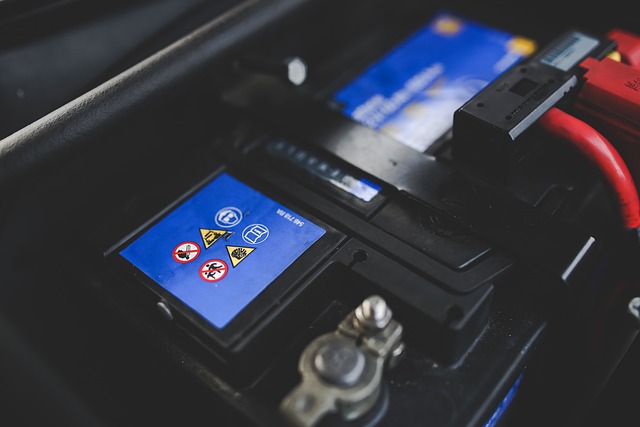Heat is both vital for maintaining car battery performance and detrimental to its longevity. High temperatures accelerate chemical reactions, causing corrosion and reducing energy storage. Regular exposure to intense heat, like running an engine in hot conditions or leaving it in direct sunlight, significantly degrades batteries, making timely replace car battery necessary. Different battery types have unique heat sensitivities; lead-acid and lithium-ion batteries both experience reduced capacity and life expectancy from prolonged high-temperature exposure. To protect against heat-related issues, practice regular maintenance like cleaning, proper ventilation, balanced charging, and cool parking. Promptly addressing corrosion prevents major performance problems, especially in hot environments.
In the relentless heat of summer or the frigid cold of winter, your car’s battery plays a vital role in keeping your vehicle powered. Understanding how heat impacts battery performance is crucial for maximizing its lifespan and ensuring reliable starts. This article delves into the intricate relationship between batteries and temperature extremes, exploring specific effects on various car battery types, offering strategies to mitigate heat’s harm, and emphasizing the importance of regular maintenance in hot environments for a longer-lasting replace car battery.
- Understanding the Battery-Heat Relationship
- How Heat Affects Different Types of Car Batteries
- Strategies to Mitigate Heat's Impact on Battery Performance
- The Case for Regular Battery Maintenance in Hot Environments
Understanding the Battery-Heat Relationship

Heat plays a significant role in dictating the performance and longevity of batteries, including those found in our everyday essentials like cars. Understanding this relationship is crucial for anyone looking to maintain or replace their car battery effectively. When a battery operates, it generates heat as a byproduct of chemical reactions, especially during high-drain scenarios like starting the engine or powering accessories. While a small amount of heat is normal and necessary for optimal performance, excessive heat can lead to significant degradation.
In the context of a car, leaving the engine running in hot conditions or frequently exposing the battery to intense sunlight can cause it to overheat. This acceleration of aging weakens the chemical bonds within the battery, reducing its capacity to store and deliver energy efficiently. As a result, a once-reliable car battery may struggle to turn over the engine or maintain adequate power, necessitating a timely replace car battery.
How Heat Affects Different Types of Car Batteries

Heat plays a significant role in influencing the performance and longevity of car batteries, which is an essential component for reliable vehicle operation. Different types of car batteries react uniquely to elevated temperatures, impacting their overall health and functionality. Lead-acid batteries, commonly found in many vehicles, are sensitive to heat; prolonged exposure can lead to reduced capacity and decreased life expectancy. The chemical reactions within the battery that provide power are accelerated at higher temperatures, causing premature corrosion and degradation of internal components.
When considering a replace car battery scenario, understanding how heat affects specific models is crucial. For instance, lithium-ion batteries, increasingly popular for their lightweight design and high energy density, have different characteristics. While they offer superior performance in extreme conditions compared to lead-acid batteries, prolonged exposure to high temperatures can still cause thermal degradation, reducing the overall cycle life of the battery. This highlights the importance of maintaining optimal operating temperatures to ensure top battery performance and longevity, prompting drivers to address any concerns regarding battery health promptly.
Strategies to Mitigate Heat's Impact on Battery Performance

To mitigate heat’s impact on battery performance, several strategies can be employed. One effective approach is regular maintenance, including keeping the battery clean and ensuring proper ventilation. Using a cooling system or placing the vehicle in a shaded area during extended parking periods can also help regulate temperature. Additionally, avoiding extreme charging rates and maintaining a balanced state of charge (SOC) can preserve battery health.
When considering a replace car battery, look for models designed with advanced thermal management features. Modern batteries often incorporate special cooling mechanisms and materials that distribute heat more efficiently. Moreover, utilizing smart charging systems that adapt to different conditions can prolong battery life by preventing overcharging and overheating.
The Case for Regular Battery Maintenance in Hot Environments

In hot environments, regular battery maintenance becomes even more crucial. Extreme heat can accelerate the natural degradation process of a car battery, leading to reduced performance and, in severe cases, failure. This is because heat increases chemical reactions within the battery, causing it to lose charge faster and reducing its overall lifespan. To combat this, it’s essential to keep the battery clean and well-maintained, ensuring optimal performance even under demanding conditions.
One of the key aspects of maintenance is regularly checking and replacing a car battery when necessary. Over time, batteries can develop leaks or corrosion on their terminals, which hinders their ability to hold a charge effectively. By promptly addressing these issues, drivers can prevent more significant problems that could leave them stranded. Regular servicing also includes top-up levels of electrolyte (if applicable) and inspecting the overall health of the battery, ensuring it’s in top condition to withstand the hot climate.
In conclusion, heat significantly influences battery performance across all vehicle types. Understanding this relationship and implementing strategies to mitigate its effects, such as regular maintenance, is crucial for maximizing battery lifespan. Whether in a hot urban environment or off-road adventures, recognizing the impact of heat on your car battery and taking proactive steps can ensure reliable operation and prevent unexpected breakdowns, ultimately enhancing peace of mind while driving. Consider regular battery checks and replacements as a necessary part of maintaining your vehicle’s overall health, especially in challenging climates.
